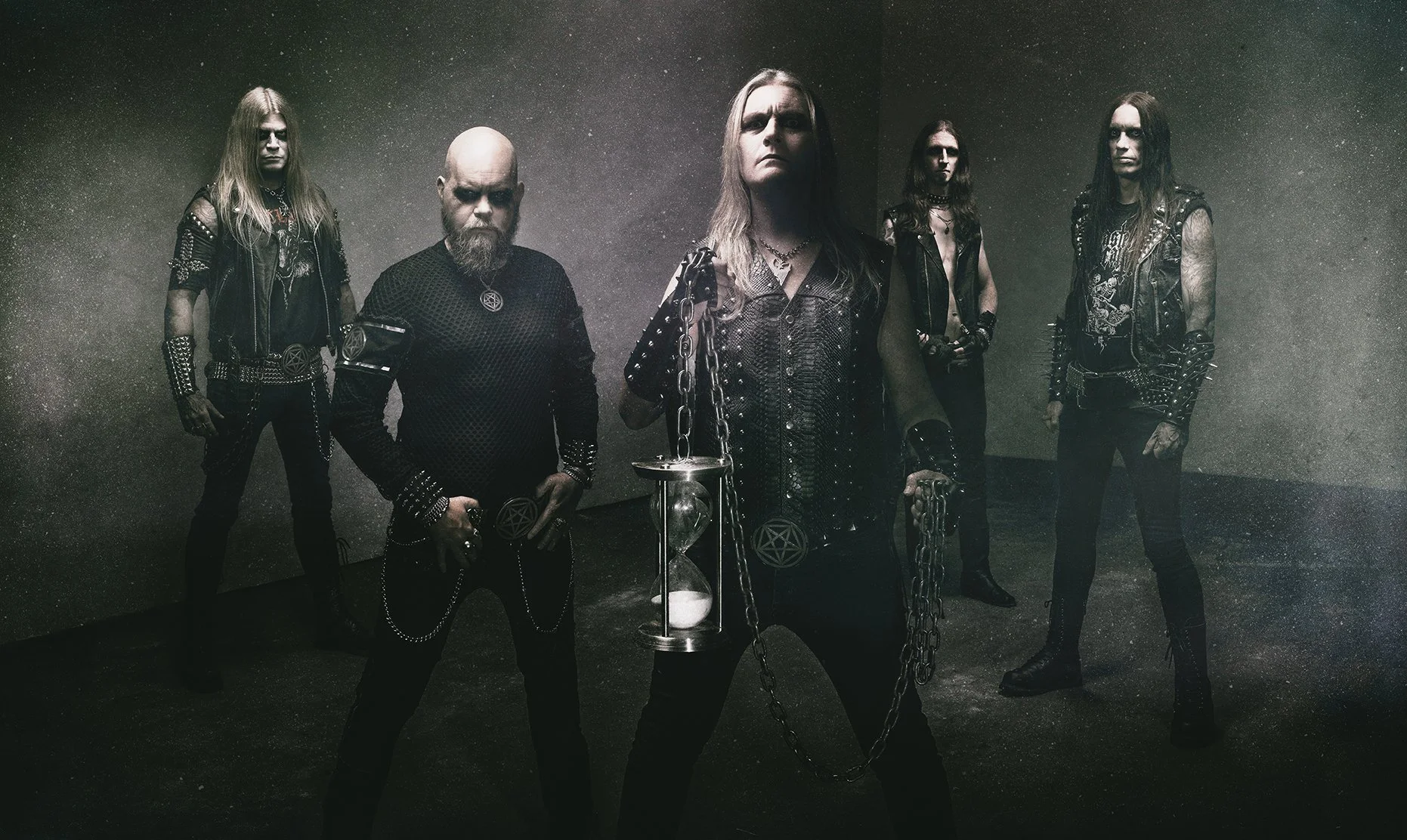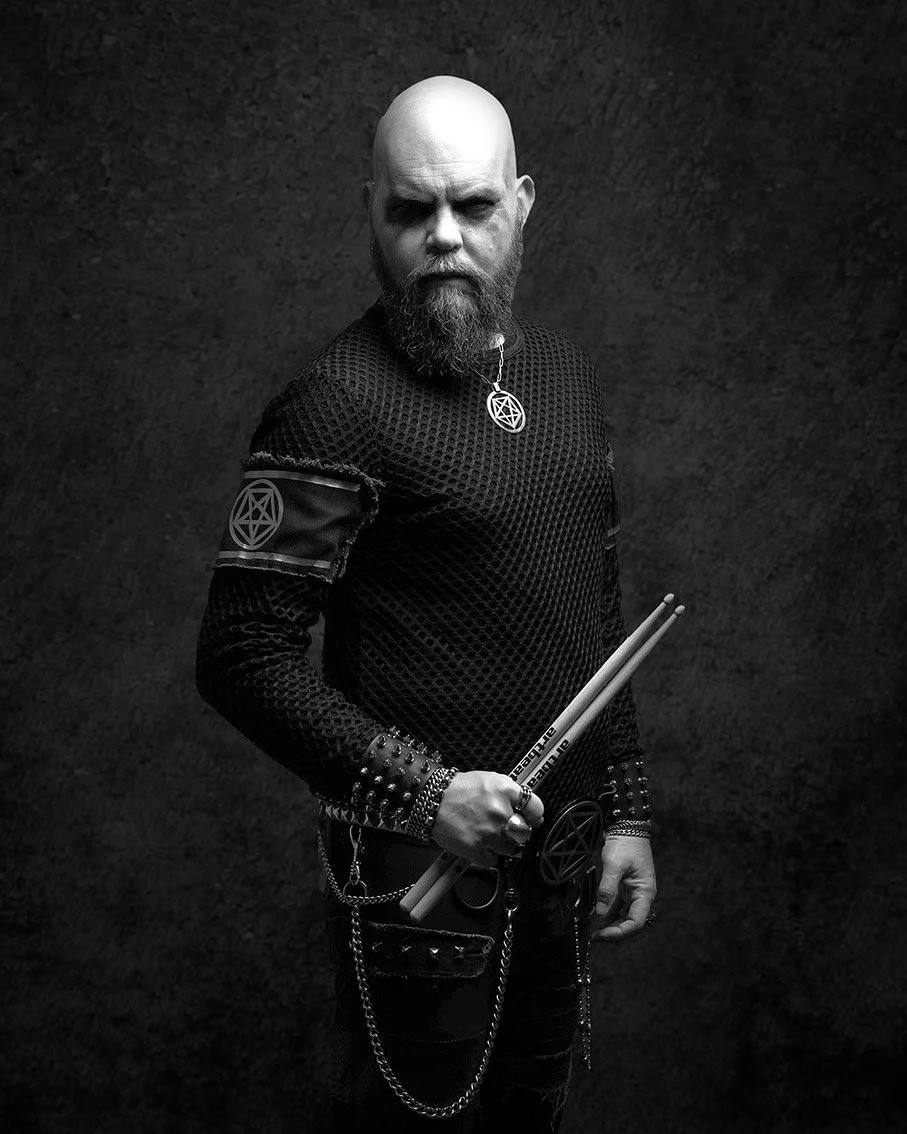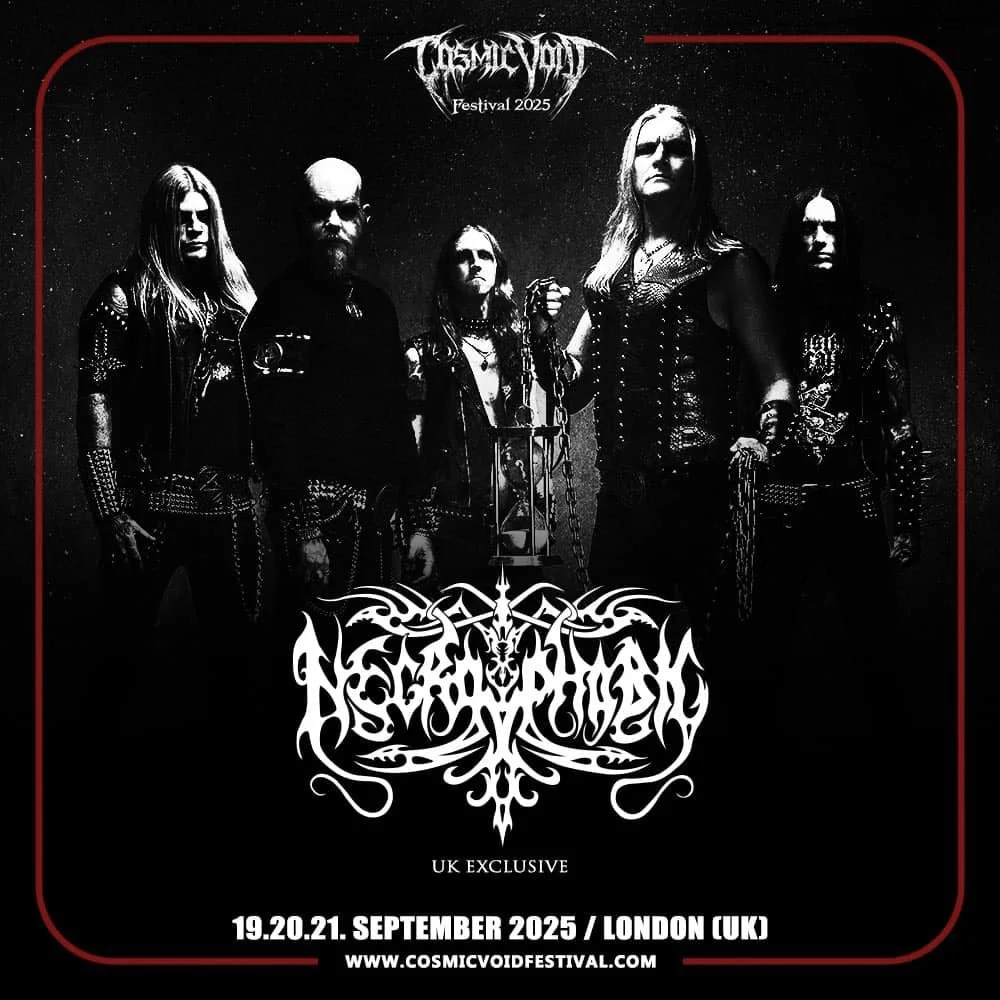
“We have always been close to black metal, even though we are death metal in our foundation. we DIDN’t want to be included in the typical death metal scene, both music-wise and image-wise.”
NECROPHOBIC
———————————
EXCLUSIVE INTERVIEW (2025)
———————————
Born at the tail end of the 1980s, Necrophobic are one of the godfathers of the Swedish metal scene, having always kept a foot in both death and black metal, much like many of their peers and countrymen – Dissection, Unanimated, Sacramentum – even when the two scenes were at their most polarised. The band have also managed an impressive degree of consistency, having never released a poor record during their lengthy career. Certainly, the group’s most recent opus, last year’s epic and exhilarating In the Twilight Grey, has lived up to the strength of its predecessors, earning strong reviews from fans and critics alike.
Despite four of the present members having been in the group since the early 2000s – and two of those having been present on the iconic 1993 debut album The Nocturnal Silence – it is drummer and co-founder Joakim Sterner who has served longer than any in the group. Today he acts as the band’s mouth with Cult Never Dies and we spoke to this metal veteran as he prepares for Necrophobic’s first UK show in about a decade at London’s Cosmic Void Festival.
Cult Never Dies: You’ve been playing in Necrophobic since it formed in the late 1980s, and for the most part, the band’s latest releases seem to be as well-received by fans as your early recordings. Has it been difficult to keep the band going for so long while maintaining the same spirit and level of quality?
Joakim Sterner: “Of course, it has been like a roller-coaster, to use a cliché, but most of the time it has been a great time, with a lot of development and new levels. The music has more or less been sounding the same – and that is what we want, both for ourselves, but also for our fans, so they more or less know directly it’s our music when they hear it. What has kept us going is the fans –they have always been there, buying our music and coming to our shows – but also our passion for this music. We are so much into metal music ourselves; it is our lifestyle, so we are metal fans creating metal music.”
It’s been over a year since the release of the exhilarating album, In the Twilight Grey. With the benefit of a little time, how do you now feel about the record in comparison to the rest of your discography?
“I think it is maybe not our best album of all the ones that we have released, but I still think it is one hell of an album. I have some personal favourites on it, and it also shows a, how can I say it, a new way for us to write songs that fit our music style and sound. Now I may have made you think that there is something wrong with the album, but there isn’t. I just personally have another album I put on my pedestal. In the Twilight Grey belongs up there with our best releases.”
It’s been some time since the band played England – how do you feel about the forthcoming appearance, and do you have any particular thoughts and feelings about visiting the UK, either as a musician or traveller?
“I really look forward to coming to England. The last time the band was there was in 2015 or so. I was there personally just two years ago. I love London. I love the feeling of the town, and I also am a supporter of one of the football teams coming from London … Tottenham! I was also becoming a metal fan in the early 80s with bands like Iron Maiden, Saxon, Judas Priest, Def Leppard and so on, so England means a lot to me musically as well.”
How is it for you to play festivals these days and has the experience changed at all over the years? Do you catch other bands or keep away from the crowds before your performance?
“I like playing at good, organised festivals that treat the artist and our work on stage on a professional level. We have grown bigger as a band as well, so we have also played a lot of the bigger festivals. For me, as a drummer, it’s fantastic to have access to build my kit during the time that another band is playing, instead of having just 15 minutes to build it while there is also a changeover going on. Such things were not common for me many years ago. If I have time, I see other performing bands, of course. I am a metal fan.”
Drumming is arguably the most physically demanding role in an extreme metal band. Is this something you have to keep in mind in terms of fitness and energy levels as you get older?
“Back when I was younger, I did not pay so much attention to how my body felt. It took care of itself [laughs]. No, but seriously, I try to exercise many times per week, but I don’t go to gyms. I take long powerwalks that burn calories and also keep my body in trim and help me keep my endurance and fitness, because as you say, playing drums in this type of music is really physically demanding.”
Necrophobic have always been a band that appealed to those in both the black and death metal camps. Sweden as a whole always seemed to have a more blurred line between these scenes, but how do you relate personally to these two genres? Do you think you’re more inspired by one than the other, or feel more a part of either?
“We have always been close to black metal, even though we are death metal in our foundation. However, already from the beginning we didn’t want to be included in the typical death metal scene, both music-wise and image-wise. I was already at an early stage categorising our music as ‘blackened death metal’, and back then, there were few that used that term. We are not inspired more [by one than] the other, I think. We are trying to keep our way of writing songs that contain strong melodies that give you the feeling of coldness and darkness.”
The line-up of Necrophobic has obviously evolved over the years, with you acting as something of a constant. Has the band felt very different with the different musicians, or do you feel like there’s always a strong continuity there?
“It’s hard to answer, really. When a new member joins, he quickly learns what this band is all about. But a couple of years ago, I must admit that I felt lost. Too much had changed during a short period of time, member-wise. I did not feel that it wasn’t fun anymore, it was just that when I looked around, there were so many new faces, even though they were my friends. I felt that I needed to do something about it, even if it was nothing that was bad, so to speak. And I did. As I see it, referring a little to your question, we made just one album with members who just had a short history in the band. Most of our albums have been with many constant members.”
Interview by Dayal Patterson.
Photos by Jens Rydén.




